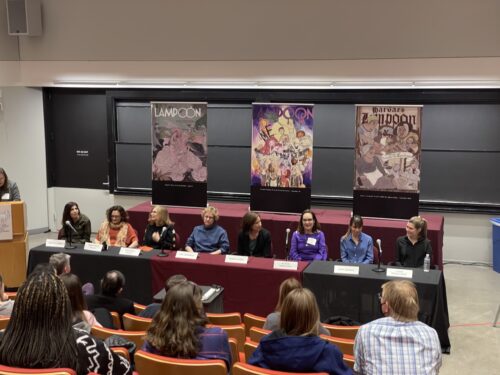On April 4th, an audience of students and graduates, Lampoon members and outsiders, shuffled around Science Center C to hear “A Writer’s Room of One’s Own,” a panel of female Lampoon graduates who lead successful careers in print media, film and television, from The New Yorker to Saturday Night Live. The panelists—many of whom knew each other from their college days—were cheery and rowdy, poking fun at each other, reminiscing on their times in the castle, and how the student magazine shaped their voices as women after college.
Rebecca X ’97, story editor of Buffy the Vampire Slayer and Gilmore Girls, said The Lampoon helped her find a space of belonging at Harvard and in her field of work. “We were like a merry band of brothers,” she said of the comradery she built with The Lampoon women.
Many of the panelists were female trailblazers in their times at the organization. Patricia Marx ’75, a humorist and writer for The New Yorker, was the first female member of the magazine. Alexis Wilkinson ’15, a writer for Veep and Brooklyn Nine-Nine, was the magazine’s first Black female president.
The Lampoon was founded in 1876 as a space for men. Even after it admitted women for the first time in 1971, many of its women felt excluded, an experience they encountered once again in the working world. “I’ve worked in several late night rooms which have been predominantly male, and I have felt unfortunately it’s a boys club, as The Lampoon was,” opened children’s book author Claire Freedman ’07. “That’s sort of the unfortunate truth. I wish I had something funny to add to lighten that, but that’s just the reality.”
Comedian Sierra Katow ’16 quipped that being a member of the organization taught her “a lot about male ego.” Katow recently acted in The Sex Lives of College Girls as a writer for The Catullan, which she described as a “toxic college humor magazine.” She joked that it was easy to portray this role after her time at Harvard. But ultimately, Wilkinson said, The Lampoon taught her how to succeed in a space dominated by white men: “mostly by being loud and good at what you do.”
Many of the panelists were mothers and recalled the strains of balancing parenting tasks, like breastfeeding and nanny care, with full-time creative jobs. Meanwhile, Rebecca X said that motherhood made her better at her job: “bringing consciousness” to a person and to a piece of writing are radically similar acts, she asserted. “Being a mother knocks the shit out of you in a way that makes you finally capable of saying something interesting and making you know you have something to say.”
Others, like Marx, recalled fighting tooth and nail to get into the room of a competitive workplace. Ann Hodgeman ’78, on the other hand, described the necessity of accepting less enticing job offers when starting out in an industry: “You may have to be good at a bad job.”
While taking pride in their accomplishments at The Lampoon and beyond, the panelists emphasized that people shouldn’t take themselves too seriously. They prefer to be politically correct and be funny—as X said, “If you’re being truthful, you’re doing both.” Shannon Gaughan ’81, a producer and writer known for her work at SNL, recalled one of the first sketches she ever wrote. “Most of you in the audience would probably consider it a micro-aggression now,” she joked.
Television producer Shana Goldberg-Meehan ’84 spoke about her work on the hit show Friends and a particular scene where the actresses try on wedding dresses. She tried to change the stereotype that every woman wants a wedding, but when they tried the scene her way, it was considered “awful.” Through this experience, Goldberg-Meehan learned, “comedy is going to trump all, I’m sorry to say, all your ideals.”
When Wilkinson was working on Veep, she insisted to the older writers the necessity of being flexible, as ideals and concepts of comedy have changed. Television writer Claire Freedman ’07 agreed on the importance of being malleable in the fast-changing media landscape. “You have to have many arms in the fire,” she said, referring to the multitude of outlets, from TikTok to Twitter, that young creators now use to gain popularity.
Children’s book author Sarah Albee ’84 explained how she’s adapting her writing to a child-centric audience, since kids aged 8-12 are now choosing their own books, as opposed to their parents choosing for them. In her recent book Fairytale Science, she conducted experiments to test whether the strength of hair could actually hold up a prince, like in Rapunzel. In other books, like Poop Happened, she interweaves learning with entertainment. For Albee, writing for the next generation means adaptation and constantly learning.
While the women said they owe a lot to The Lampoon, they underscored the necessity of the work Harvard alumni do following graduation to build their careers. “You can’t just waltz out of Harvard into a good job,” one panelist said.
At one point, a student asked the panelists about their Harvard privilege and their role as a part of the “establishment.” The room fell silent.
Alison Umminger ’92, a novelist and professor at the University of West Georgia, fielded the question. “I would flip that back at you and argue that everyone in this room is a part of the establishment,” she said. Cheers from students and alumni followed. Umminger said women in positions of power must give back to women with less privilege, emphasizing that not all the panelists had the same path to industry success.
After the event, Umminger reflected on how her experiences as a second generation college student helped her understand the value of teaching and giving back: “Harvard opens doors for you that it wouldn’t for other people, and remembering that, I can hold the door open and not just run right through it.”
Proof Schubert Reed ’25 and Reina Pimentel ’25 write for the Independent.

